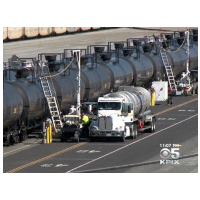Judge Says Lawsuit Is Too Late to Contest Crude-by-Rail Deliveries to Richmond
 Richmond oil train offloading (screen grab: CBS San Francisco)
Richmond oil train offloading (screen grab: CBS San Francisco)
Sometimes it pays to be deceptively quiet.
Last Friday, San Francisco County Superior Court Judge Peter Busch ruled that environmentalists could not sue to halt deliveries of crude oil by train to a rail terminal in Richmond that began early in the year because they had missed a 180-day window of opportunity.
The judge acknowledged that energy company Kinder Morgan and its regulator, the Bay Area Quality Management District (AQMD), did not inform the public in July 2013 when a permit was issued to expand an ethanol facility to accept crude oil, but said the law did not require them to be forthcoming.
The public and Richmond city officials became aware of the change in March, when the media stumbled on it after the permit was amended the month before. The city has no control over the facility. The crude is transferred from trains to trucks and sent to a refinery in nearby Martinez.
Earthjustice, which filed the lawsuit on behalf of Communities for a Better Environment (CBE), the Asian Pacific Environmental Network, the Sierra Club and the Natural Resources Defense Council (NRDC), asked the court to halt operations immediately until a complete review was conducted under the California Environmental Quality Act (CEQA).
Instead, the judge ruled both the permit and amended permit can be issued administratively without environmental review or public notice.
“This is just how the agencies and industry wins―hide the information, make the change under the cover of night, and hope people don't notice while the clock winds down on any hope to stop these dangerous and callous developments,” Earthjustice attorney Suma Peesapati said in a statement.
Californians have been expecting a big shift in how crude oil arrives at its refineries and transfer points. Most of the oil arrives by ship or pipeline. In 2012, only 0.2% of the 598 million barrels of oil arrived by rail in California.
The California Energy Commission (CEC) has said it expects rail to account for a quarter of imports by 2016 as oil production in the West booms and producers look for refiners. And, of course, tar sands oil from Canada looms as Alberta looks to ship the world’s dirtiest petroleum product to the Gulf Coast via the controversial Keystone XL pipeline and California via trucks and rail.
Railroads are carrying 25 times more crude oil nationally than they were five years ago and the increase is reflected in oil spill incidents. The oil arriving in Richmond, from North Dakota’s fracked Bakken area, is considerably more flammable than conventional crude. And, according to Environment and Energy Daily, transportation experts warn that the aging train cars are susceptible to rupture and puncture in a derailment.
CBS Sacramento, which first spotted a train making oil deliveries in March, said it was similar to one that exploded in Quebec in July 2013, killing 47 people, burning down 50 buildings and unleashing a “river of burning oil” through sewers and basements.
The state passed various laws this year in anticipation of the crude-by-rail explosion, literally and figuratively. A couple of bills passed in the summer were aimed at beefing up emergency response, in case something goes horribly wrong, and prevention. Governor Jerry Brown signed off on legislation last week that requires railroad companies to let state and local emergency officials know about planned oil shipments.
But it remains to be seen if any of the actions taken by lawmakers will give the public an unobstructed view of the dangerous materials being shipped through urban areas and sensitive habitats.
–Ken Broder
To Learn More:
California Judge Throws Out Lawsuit Targeting Kinder Morgan Crude by Rail Facility (by Rory Carroll and Jennifer Chaussee, Reuters)
Richmond: Judge Tosses Out Suit Seeking to Stop Crude Oil Shipments by Rail (by Tom Lochner, Contra Costa Times)
Judge Says Suit to Stop Richmond Oil Shipments Filed Too Late (by Bob Egelko, San Francisco Chronicle)
State Energy Commission Official Ignorant of Dangerous Bay Area Oil Deliveries (by Ken Broder, AllGov California)
- Top Stories
- Controversies
- Where is the Money Going?
- California and the Nation
- Appointments and Resignations
- Unusual News
- Latest News
- California Forbids U.S. Immigration Agents from Pretending to be Police
- California Lawmakers Urged to Strip “Self-Dealing” Tax Board of Its Duties
- Big Oil’s Grip on California
- Santa Cruz Police See Homeland Security Betrayal in Use of Gang Roundup as Cover for Immigration Raid
- Oil Companies Face Deadline to Stop Polluting California Groundwater





